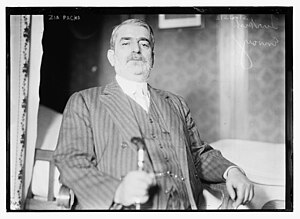Yusuf Ziya Pasha
Today, in this article we are going to delve into the topic of Yusuf Ziya Pasha. This is a topic that has sparked the interest of many people in recent times, and is essential to understanding key aspects of our society. Yusuf Ziya Pasha has a profound impact on our daily lives, influencing our decisions, beliefs and lifestyle. Throughout this text, we will explore the different dimensions of Yusuf Ziya Pasha, from its history to its relevance today. In addition, we will analyze how Yusuf Ziya Pasha has evolved over time and the implications it has in various areas of society. Without a doubt, this article will be very useful for all those who wish to better understand the phenomenon of Yusuf Ziya Pasha and its importance in today's world.
Yusuf Ziya | |
|---|---|
 1914 | |
| Ottoman Ambassador to United States | |
| In office 14 June 1910 – 1914 | |
| Monarch | Mehmed V |
| Personal details | |
| Born | 1849 Ottoman Empire |
| Died | 1929 (aged 79–80) Istanbul (known in English at the time as Constantinople), Turkey |
| Nationality | |
Yusuf Ziya Pasha (1849 – 1929), also known as Youssouf Zia Pacha, was an Ottoman politician and government minister, who was one of the figureheads of the Committee of Union and Progress (CUP). He was the Ottoman ambassador to the United States from June 14, 1910 to 1914.

His residence was Perili Köşk in Constantinople (now Istanbul) (originally known as the Yusuf Ziya Pasha Mansion). The building currently houses the headquarters of Borusan and the Borusan Contemporary art museum.
References
- ^ "Yusuf Ziya Paşa (1849-1929)". 29 June 2017.
- ^ McSpadden, Joseph Walker (1914). American Statesman.
Youssouf Zia Pacha, Ambassador Extraordinary and Plenipotentiary